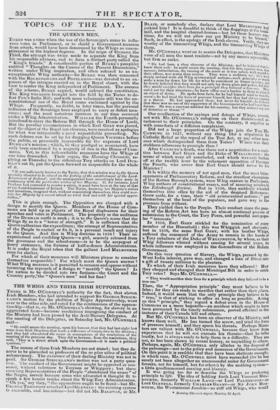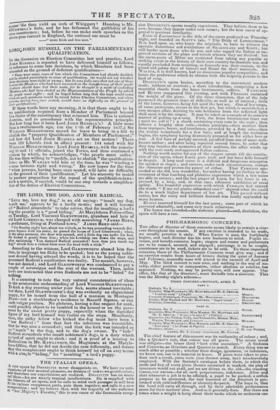THE WHIGS AND THEIR IRISH SUPPORTERS.
THERE is Mr. O'CoNNELL's authority for the fact, that eleven Irish Members, who had intended to support Sir GEORGE STRICK- LAND'S motion for the abolition of Negro Apprenticeship, went over to the other side, and voted for the continuance of the appren- ticeship—that is, on Mr. O'CoNNELL's showing, for slavery in an aggravated form—because resolutions impugning the conduct of the Ministry had been passed by the Anti-Slavery Delegates. At the meeting of the Delegates, on Saturday last, Mr. O'CONNELL said- " lie could assure the meeting, upon his honour, that they had last night lott 'votes from Irish Members that made a difference of tiventy.two in the division ; and they bad abandoned the cause in consequence of the resolutions of the meeting of the previous day. They did so because, from the resolutions, they said, 'This is a direct attack upon the Government—it is made a political question.'" The names of these Irish Members are not stated ; but they de- serve to be placarded as professors of the ne plus ultra of political subserviency. The existence of their darling Ministry was not in peril. Sir GEORGE STRICKLAND'S motion was not a party ques- tion. '11w conduct of the Government might be approved or cen- sured, without ieference to Toryism or Whiggery ; but these crawling Representatives of the People "abandoned the cause" of the Negro, merely because some who advocated it thought fit to speak a few honest truths about the Whig-Tory Administration. "Oh yes," say they, "time apprentices ought to be freed—but Mr. GEORGE THOMPSON attacked Lord GLENELG ; the existing system is execrable, and hazardous—but did not Mr. BALDWIN, or Mr. BLAIR, or somebody else, declare that Lord MELBOURNE d jockied him ? It is dreadful to think of the floggings at the treand- mill, and the hospital charnel-houses—but let these horrors co . tinue, for we will not allow our pet Ministry to be blamedn" Such, in effect, is the apology of the Irish eleven. Verily. they are worthy of the timeserving Whigs, and the timeserving Whigs of them.
Mr. O'CONNELL went on to assure the Delegates, that Ministers
ta were of all men the most resolute—not by any means squeezable, but firm as rocks.
a Ile had been a close observer of the Ministry, and he believed that knew them well : be could assure the meeting, that his firm opinion was, that menace, intimidation, the turning of the screw as it was called, with regard their offices, was worse than useless. They were a stubborn set : thy wet, deeply imbued with old 'Whig aristocratical notions—such principles as good make a man lay down his life for what he considered an honest opinion; and he firmly believed that they would not only lay down place and power, but that they would sacrifice their lives for a principle they believed a true one. II" cared not for their situations—he knew office was a burden to them in place a
an object of desire. He spoke from facts, for he had himself tried to thin the screw—he had tried the force of pressure himself, but they had always spurned at a threat. He had approached them, but never for himself—he believed that there was no one of the supporters of the Government who had lessof their favour. He was a constant solicitor for his country, but they scorned ant sat of dictation or threat."
Our recollection of the sayings and doings of Whigs, accords not with Mr. O'CONNELL'S eulogium on their disinterested at- tachment to their principles. On the contrary, it supplies us with some facts of' a different complexion. Did not a large proportion of the Whigs join the Tory Mr. CANNING in 1827, without any thing like a stipulation for Catholic Relief or the repeal of the Test Act, or any other mea- sure which distinguished them from Tories ? Where was their stubborn adherence to principle then ? After CANNIING'S death, was there not a negotiation for a coali- tion between Earl GREY and the Duke of WELLINGTON; the terms of which were all concluded, and which was only broken off at the twelfth hour by the vehement opposition of GEORGE the Fourth, who swore that Earl GREY should never be his Minister ?
It Is within the memory of not aged men, that the most bitter opponents of Parliamentary Reform, and the sturdiest champions of the Rotten Borough system, were Whig orators in Parliament, Whig authors of constitutional essays, and of sneering articles in the Edinburgh Review. But in 1930, they suddenly wheeled themselves into office by the aid of the despised Reformers; threw aside, for a time, their " old aristocratical notions ;" put themselves at the head of the populace, and gave way to the pressure from without.
They yielded then to the People. Their conduct since the pass- ing of the Reform Act has been an almost continual process of submission to the Court, the Tory Peers, and powerful anti-popu- lar "interests."
In 1810, Earl GREY stickled for the nomination of every member of the Household : this was Whiggish and obstinate; but in 1830, the same Earl GREY, with his brother Whigs, suffered the command of the Army to remain in the hands of a Tory subaltern of the Duke of WELLINGTON, by whom, as their Whig followers whined without ceasing for several years, its whole influence was employed to the discomfiture of the Reform Government.
On this very question of Slavery, the Whigs, pressed by the West India interest, gave way, and changed a loan of fifteen into a gift of twenty millions to the planters.
To which of their Irish measures have they adhered ? How they chopped and changed their Municipal Bill in order to catch Tory votes ! Says Mr. O'CONNELL--.- " They would sacrifice their lives for a principle which they believed to be true one.'
Then, the "Appropriation principle" they must believe to be false; for they are ready to sacrifice that rather than their places. Indeed, it would seem that the only principle they believe to be "true," is that of sticking to office as long as possible. Acting on this" principle," they regard a defeat even in the House of Commons as a mere bagatelle—an accident which ought to have been prevented by the timely submission, proved effectual in the instance of their Canada bill and others. But Mr. O'CONNELL has been an observer of the Ministry, and knows them well. He has turned the screw, and tried the force of pressure himself; and they spurn his threats. Perhaps Minis- ters are valiant with Mr. O'CONNELL, because they know from experience that lie will not execute his threats—that he talks loudly, but is always ready to help them in a difficulty. They are not, as has been shown by recent history, so unyielding to others. Perhaps, again, Mr. O'CONNELL only alludes to the disposal of the patronage—not to the policy and measures of the Government. On this point it is credible that they have been obstinate enough; in which case, Mr. ()rostrata. must have succeeded (for he has surely not been altogether an unsuccessful suitor for Government favours, not for himself, but for others) by the soothing system— a little goodhumoured coaxing and blarney.
It was going too far to describe the Whigs as
preferring principle to life. The idea of holding forth Lord Viscount MEL- BOURNE, formerly WILLIAM LAMB—or Lord PALMERSTON—or Lord GLENELG, formerly CHARLES GRANT—or Sir JOHN Hoe- HOUSE, the Westminster Jacobin—as stiff old Whigs, who would • Morning Chronicle report, Monday 2d April. soonee:die than yield an inch of Whiggery ! Humbug is Mr. O'CornIELL's forte, and he has fathomed the gullibility of his own countrymen; b. ut, before he can make such speeches as the above pass current in England, the national ear must be
more Irish and less nice."



























 Previous page
Previous page